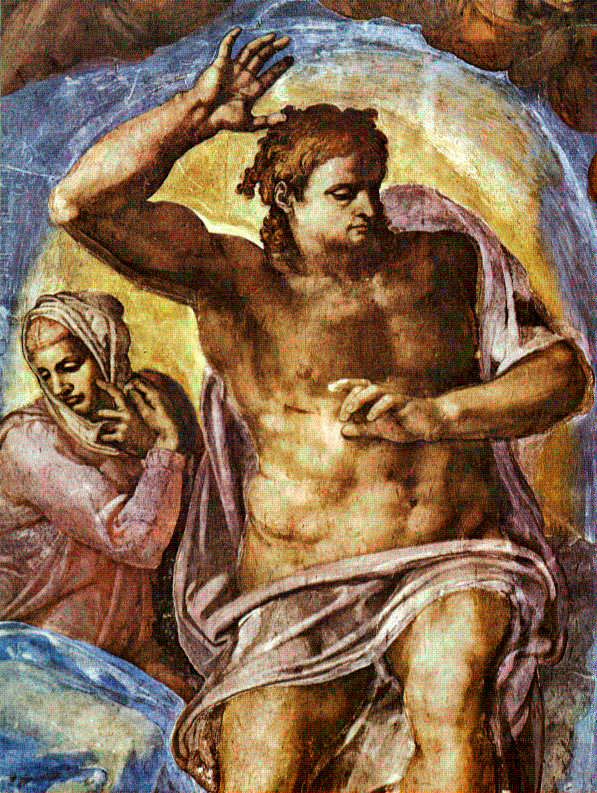
Episcopalians (Anglicans) and Roman Catholics are again praying a similar prayer on the Feast of Christ the King – The Reign of Christ, the last Sunday of the Western Church’s year, November 22. Episcopalians will pray:
Almighty and everlasting God,
whose will it is to restore all things in your well-beloved Son,
the King of kings and Lord of lords:
Mercifully grant that the peoples of the earth, divided and enslaved by sin,
may be freed and brought together under his most gracious rule;
who lives and reigns with you and the Holy Spirit, one God, now and for ever. Amen.
This is Howard Galley’s translation of the pre-Vatican II Roman Missal collect for the feast of Christ the King:
Omnipotens sempiterne Deus, qui in dilecto Filio tuo, universorum Rege, omnia instaurare voluisti: Concede propitius, ut cunctae familiae Gentium, peccati vulnere disgregatae, eius suavissimo subdantur imperio; qui tecum vivit et regnat in unitate Spiritus Sancti, Deus, per omnia saecula saeculorum. Amen.
After Vatican II, the Roman Catholic Church moved the feast day and altered the double purpose clauses:
Omnipotens sempiterne Deus,
qui in dilecto Filio tuo, universorum Rege,
omnia instaurare voluisti,
concede propitius,
ut tota creatura, a servitute liberata,
tuae maiestati deserviat ac te sine fine collaudet.
ICEL (1973) translates this as:
Almighty and merciful God,
you break the power of evil and make all things new
in your Son Jesus Christ, the King of the universe.
May all in heaven and earth
acclaim your gloryand never cease to praise you.
Let us widen the circle that prays this prayer together on Sunday beyond Catholics and Anglicans.
Kiwi Anglicans have another collect assigned to the feast of Christ the King but since they are allowed to vary the collect from the one suggested, I encourage them to join the majority of Christians praying the above this coming Sunday, even if it is in the NZPB version:
Let us pray (in silence) [that the reign of Christ may live in our hearts and come to our world]
pause
Almighty and eternal God,
you have made of one blood all the nations of the earth
and will that they live together
in peace and harmony;
so order the course of this world
that all peoples may be brought together
under Christ’s most gentle rule;
through Jesus Christ our Lord
who is alive with with you and the Holy Spirit,
one God now and for ever.
Amen.
NZPB p. 637b




Worshiping Christ the King is easy for you to say, because you (technically) have a monarch. Those of us without one find that all sorts of ideas better identified with the Castle at Disney’s Magic Kingdom come forth in sermons.
In today’s world, I’m sure you people with monarchs have it much easier–particularly in constitutional monarchies. There is no more “divine right” associated with the monarch, who only performs functions as head of state, not head of government.
I’m reminded that my neighbors to the not-too-far north, Canada, has a picture of Her Majesty on the obverse of the one dollar coin–with a picture of a loon on the reverse. They call this coin with a picture of the monarch the “loonie.”
It went further. When Canadian paper currency had pictures of birds on the back, they had a very-clearly labeled “common loon” on the back of the $20 bill. It had Her Majesty on the front.
So, if I learn from the Canadian example, am I to think of monarchs as loons (common or otherwise)?
When I expressed this frustration of calling this Sunday “Christ the King” to my former rector, his response was that maybe I needed to examine it further. All I can say is that his sermons did not help one bit. I still see a monarch as a figurehead called a common loon.
Rome only established Christ the King Sunday to counteract what they saw as a problem to the authority of the Pope: the disappearance of the Papal States into Italy, leaving only Vatican City. Why would I want to change that?
What I can understand is the concept of the Triumph of Christ. Why can’t we call it that?
Bob, my sermon this morning, compared Christ’s kingship with our monarchy in robes, procession, crown, throne, guards, etc.
I think Christ’s kingship turns our normal concept of royalty upside down and inside out.
I’m not sure where you get your origin of this Sunday from – if you clicked through to my commentary, you would note I source it as a response to Reformation Sunday.
I’m not sure that all the “divine right” has gone. As Queen of New Zealand, Elizabeth is officially, “Elizabeth the Second, by the Grace of God, Queen of New Zealand and Her Other Realms and Territories, Head of the Commonwealth, Defender of the Faith.” She is, of course, the first Elizabeth to be queen of New Zealand. This means, IMO, there is an error in her title. She is Queen Elizabeth the Second in England. She should actually be Queen Elizabeth the First here.